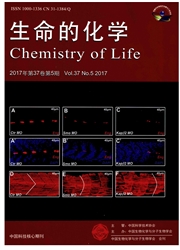

 中文摘要:
中文摘要:
蛋白酶激活受体(protease-activated receptor,PAR)属于G蛋白偶联受体家族,包括4个成员,除PAR2为胰蛋白酶受体外,其他三个都是凝血酶受体,PAR通过形成或暴露新的N末端被激活。PAR广泛表达于全身各组织,尤其在消化系统表现出多种功能;通过促进细胞增殖、迁移、浸润、血管生成以及组织重构(通过促进细胞增殖、迁移、浸润和血管生成),同时抑制细胞的分化和凋亡等因素参与肿瘤的发生和发展,这为临床诊治和预后评判提供了有力的手段。
 英文摘要:
英文摘要:
Protease-activated receptors are G-protein-coupled receptors that are responded to extracellular proteases and activated by forming or exposing a tethered ligand.There are four protease-activated receptors(PARs) encoded in the mammalian genome.PAR1,PAR3 and PAR4 are respond to thrombin,whereas PAR2 is activated by trypsin.PARs are expressed extensively in many organs,and involved in various functions in digestive system.They play important roles in cancer development by promoting cell proliferation,migration,invasion,angiogenesis,and inhibiting cell differentiation,apoptosis,and might have some clinical implications in cancer's diagnosis,therapy and prognosis.
 同期刊论文项目
同期刊论文项目
 同项目期刊论文
同项目期刊论文
 Cell migration-promoting and apoptosis-inhibiting activities of Bm-TFF2 require distinct structure b
Cell migration-promoting and apoptosis-inhibiting activities of Bm-TFF2 require distinct structure b Characterization of the betagamma-crystallin domains of betagamma-CAT, a non-lens betagamma-crystall
Characterization of the betagamma-crystallin domains of betagamma-CAT, a non-lens betagamma-crystall Establishment, characterization and immortalization of a fibroblast cell line from the Chinese red b
Establishment, characterization and immortalization of a fibroblast cell line from the Chinese red b Activation of protease-activated receptor (PAR) 1 by frog trefoil factor (TFF) 2 and PAR4 by human T
Activation of protease-activated receptor (PAR) 1 by frog trefoil factor (TFF) 2 and PAR4 by human T betagamma-CAT, a non-lens betagamma-crystallin and trefoil factor complex, induces calcium-dependent
betagamma-CAT, a non-lens betagamma-crystallin and trefoil factor complex, induces calcium-dependent Two novel families of antimicrobial peptides from skin secretions of the Chinese torrent frog, Amolo
Two novel families of antimicrobial peptides from skin secretions of the Chinese torrent frog, Amolo beta gamma-CAT, a non-lens beta gamma-crystallin and trefoil factor complex from amphibian skin secr
beta gamma-CAT, a non-lens beta gamma-crystallin and trefoil factor complex from amphibian skin secr Melanoma cell growth inhibition by beta gamma-CAT, which is a novel non-lens betagamma-crystallin an
Melanoma cell growth inhibition by beta gamma-CAT, which is a novel non-lens betagamma-crystallin an A Novel Non-Lens beta gamma-Crystallin and Trefoil Factor Complex from Amphibian Skin and Its Functi
A Novel Non-Lens beta gamma-Crystallin and Trefoil Factor Complex from Amphibian Skin and Its Functi Acute toxicity of beta gamma-CAT, a naturally existing non-lens beta gamma-crystallin and trefoil fa
Acute toxicity of beta gamma-CAT, a naturally existing non-lens beta gamma-crystallin and trefoil fa A novel annexin A2 protein with platelet aggregation-inhibiting activity from amphibian Bombina maxi
A novel annexin A2 protein with platelet aggregation-inhibiting activity from amphibian Bombina maxi 期刊信息
期刊信息
